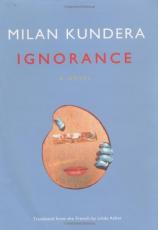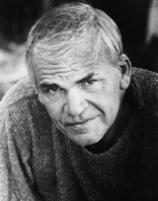Reading Group Guide
Discussion Questions
Ignorance

1. As in his previous novels, Kundera isn't content to merely tell a story; he also comments on it, via digressions on themes ranging from history to etymology and music. What is the effect of this method? Does it emotionally distance you from the narrative and characters or cause you to see them in a different light? Would you describe Ignorance as a realist novel?
2. When her Parisian friend Sylvie urges her to go home to her country, Irena replies "You mean this"--meaning Paris -- "isn't my home anymore?" This exchange suggests that "home" may be a relative phenomenon, that today's home may not be tomorrow's. How is this theme developed elsewhere in Ignorance? Can any of Kundera's characters be said to have a true home, or is home in this book always changeable, unreliable, and perhaps even illusory? And is going home a guarantee of happiness?
3. Even as Ignorance questions the permanence of home, it also raises doubts about the authenticity of the self, as in this moment when Irena glimpses her reflection in a department store mirror: "The person she saw was not she, it was somebody else, or…it was she but she living a different life." [p. 31] How would you sum up this novel's view of identity? Have Kundera's characters chosen their identities or have their identities been imposed on them by outside forces?
4. Early in the novel Kundera draws a series of correspondences and oppositions: between homesickness, nostalgia, and ignorance; between the longing for a place and the longing for a vanished past or a lost love. How does he develop these themes? Is Irena's nostalgia, for example, merely an expression of ignorance? Conversely, what is the reason for Josef's "nostalgic insufficiency?" [p. 74] When do these characters confuse homesickness with other types of longing, and with what consequences?
5. What is the significance of Ignorance's frequent references to The Odyssey? Do any events in this novel parallel those in Homer's epic? Is Josef's devotion to his deceased wife, for example, meant to recall Odysseus's devotion to Penelope? Compare the way Kundera uses The Odyssey in this book to the way Joyce uses it in Ulysses.
6. "Our century is the only one in which historic dates have taken such a voracious grip on every single person's life." [p.11] In what ways are the characters in Ignorance shaped by history and their personal destinies determined by it? Are they ever able to resist history? Does Kundera's view of historical forces hold out any hope for the freedom and dignity of the individual?
7. How would you describe Irena's and Josef's relationships with their families and old friends? Why are these so often marked by suspicion, incomprehension or outright hostility? In contrast, Irena and Josef seem to share a frictionless instant intimacy, even though they are little more than strangers. Is Kundera suggesting that the intimacy of strangers is somehow superior to the stifling, conventional closeness that prevails within most families? Are some of the characters' relationships more genuine than others?
8. What role is played by Irena's friend Milada who, unbeknown to Irena, was once Josef's girlfriend? Does Josef's past treatment of Milada predict his future behavior toward Irena? Is he morally responsible for Milada's mutilation or has Milada merely sacrificed herself for a sentimental fantasy? What do you make of Kundera's use of coincidence? Does he seem to view it the way Irena does -- as an expression of fate?
9. Are you surprised by the sexual encounter between Irena's mother and her boyfriend? Does it strike you as a betrayal of Irena, who at the time is betraying Gustav with Josef? Is Josef himself guilty of betraying Irena by his silence? How would you characterize this novel's attitude toward sex?
Ignorance
- Publication Date: December 3, 2007
- Hardcover: 208 pages
- Publisher: Harper
- ISBN-10: 0060002093
- ISBN-13: 9780060002091







